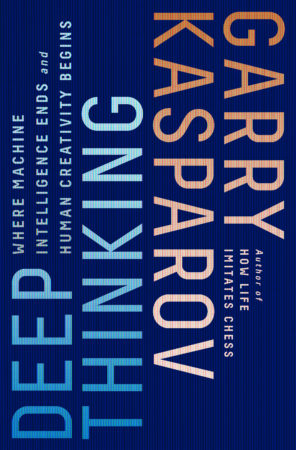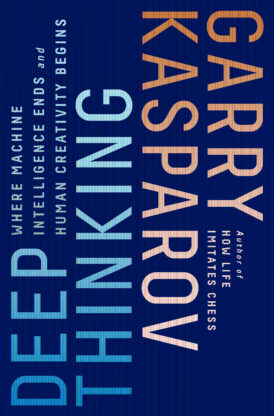Artificial intelligence doesn’t get tired or angry. It can eliminate the traps that humans may fall into, says Mr. Garry Kasparov, one of the brightest advocates of human intelligence.
READ ORIGINAL ARTICLE AT MANAGEMENT EVENTS
by Terho Puustinen
Garry Kasparov says that intelligent people will join forces with intelligent machines.
The man feels the pressure rising inside his hard-working brain. He has won many battles and suffered some losses. He assumes that he has learnt the weaknesses of his opponent and believes that he can exploit them for his benefit.
However, a combination of self-confidence and fatigue ruins his chances. World Champion Garry Kasparov loses his queen in the decisive game. There is nowhere for the king to move. The game is over.
And that was that. Artificial Intelligence beats a human at chess. Mr. Kasparov is enraged, not with the machine but with himself. He stands up without a single glance to the software engineer who was sitting opposite him.
Twenty years have passed since this historic fight, which took place in Manhattan, New York.
The development of computer processing power has exceeded all estimates. Now you can buy a super-computer for a few hundred euros and slip it into your jacket pocket. In a few seconds you can download a web app which will defeat today’s Kasparovs with ease.
The rapid development of AI (Artificial Intelligence) is disrupting the business models of industries and services. Intelligent machines challenge the highly educated workforce in the finance, healthcare, traffic and security sectors.
Garry Kasparov has taken sides. He doesn’t consider AI as an opponent to humans. He sees it as a partner.
“The future belongs to human and computer collaboration,” he says.
“Human creativity and increasingly intelligent machines come together. We will use AI more and more as a support for our own thinking and decision-making. We need to consider what kind of cognitive functions we can outsource to machines. How will we organise this co-operation to make business more efficient and create a social environment which is more productive?”
According to Mr. Kasparov, humans will benefit from AI because computers make fewer errors. He uses his own defeat in 1997 as an example.
“The problem is that humans are inconsistent. We get tired and we will make the wrong moves under significant pressure. Our psychology works against us. Computers can eliminate the mistakes that we would make. That is the reason why I am promoting the idea of co-working. We will combine our forces with intelligent machines.”
Learn More from Garry at the European Business AI and Robotics 2017 »
Industrial Revolution, Again
Garry Kimovich Kasparov became a superstar of human intelligence in 1985 when he won the Chess World Championship, beating reigning champion Anatoly Karpov. Born in Baku, Azerbaijan, at only 22 years of age he was the youngest world champion ever. Mr. Kasparov retained his number one world ranking for 225 months from 1986 until 2005, when he brought his professional career to a close.
Recently Mr. Kasparov has been known as a human rights activist, political opponent of Russian leader Vladimir Putin, and public speaker specialising in the strategy and the future of AI.
In the autumn of 2017, he will travel to Helsinki, Finland to speak at an international conference which will focus on the business opportunities, challenges and risks of AI. The forum Business AI and Robotics is expected to attract several hundred executives, business developers and big data specialists and will be organised by Management Events, one of world’s leading companies focused on high-level business events.
“It will be Northern Europe’s number one AI conference this year, no question,” says Jenni Tolonen, CEO of Management Events. “We are very happy to announce that Mr. Kasparov will share his bold visions as a keynote speaker at our conference.”
Garry Kasparov is looking forward enthusiastically to discussions with European executives and experts. One of the other speakers is Mr. Menny Barzilay, a cybersecurity strategist who has served in the Israeli Defence Force (IDF) as Chief Information Security Officer. DBS, named the best digital bank of 2016 by Euromoney magazine, will unleash its Chief Innovation Officer Neal Cross to speak about AI opportunities in finance, and Lego’s Jesper Toubol will go deep into the future of the consumer business sector. DBS is based in Singapore and Lego is from Billund, Denmark.
Mrs. Tolonen says that Artificial Intelligence is one of the hottest topics right now. Corporations, investors and many nation states are rapidly developing their AI research and development resources.
“Many experts have compared the breakthrough of AI to the 19th century industrial revolution, which put mankind on the highway towards unprecedented progress.”
AI-supported robots may set humans free from simple, dull and laborious task such as steering vehicles or recognising other humans. Algorithms can support doctors trying to make cancer diagnoses, target marketing to the right people, and screen the most profitable stocks to investors.
Or read people’s minds.
Scientists at MIT (Massachusetts Institute of Technology) are developing a device which can observe and record human brain activity using electroencephalography (EEG) technology. The prototype is a cap that monitors brainwaves and turns them into simple actions without a single word or gesture being expressed.
Think about how guiding by telepathy could help paralysed people, just to give one example of its huge potential.
Join the Discussions at the European Business AI and Robotics 2017»
What If AI Escapes?
A great share of the work that is already performed by bots and algos improves the quality of life for billions of people. Having said that, we are facing numerous big questions and ethical problems.
Human intelligence has ruled the world sovereignly for thousands of years. The human brain is fast, flexible and mostly goal-oriented, learning more or less automatically from the mistakes made by others or the person themselves. However, considerable weaknesses exist as well. Among them we can identify slow development, restricted working time, memory and reprogramming features, and silly errors.
Educating a human takes 25 years or so. A very motivated brain will struggle with 2000 to 3000 hours for their employer in one year, while a machine can achieve almost 9000 hours at maximum capacity.
What will happen if AI-supported robots replace the human workforce too quickly? How should we organise human support if unemployment increases considerably from current levels? Where is the purchasing power to consume the output of industries and services which will be managed with increasing efficiency?
Alternatively, what could happen if Artificial Intelligence is harnessed for nefarious purposes, manipulating democracies or launching dirty wars? What will follow if AI matches human intelligence and doesn’t stop there? Can it learn without programmers, gain independence or even unshackle itself from the control of its human masters?
Several of the world’s leading technology brains have warned us about the social and ethical risks involved in the development of AI. Among these voices are those of Stephen Hawking, Bill Gates and Elon Musk. Mr. Musk has said that developing AI is almost the same thing as teaching the devil, although his company will benefit from the progress achieved.
Offensive is Winning
There is a long way to go before we reach the wildest AI and robotics scenarios. Many challenges and problems need to be overcome. The pace of development is difficult to estimate but the direction is pretty clear.
The next step for research is already here. It is called Artificial General Intelligence (AGI) and it will be followed by Artificial Super Intelligence (ASI), which imitates the operations of the brain, learns exponentially, and ultimately surpasses the capacity of its role model.
According to Mr. Kasparov, there will be progress that is inevitable. We need to talk about it but we can’t stop it.
“We have entered a new era and we don’t know what the outcome will be,” he says. “Will it be a positive utopia or a depressing dystopia? It very much depends on us. What is our attitude to new ideas? Shall we exploit them or turn our backs on them and give away the keys to others?”
The chess master recommends taking an aggressive strategy to the leaders who are interested in AI. They should go on the offensive. Cold hard facts are much more important now than provocative myths.
“We need to get rid of the shells of mythology created by Hollywood and try to look deep into the core issues. I know that if you are on the attack, you need a lot of resources and there are always risks. You can fail by taking this aggressive approach, but if you look at the big picture, statistically your chances of succeeding are better from mid- and long-term perspectives.”
Mr. Kasparov encourages business leaders and politicians to raise their eyes from the routines of daily micromanaging and focus determinedly on the big picture.
“As with Internet, or with electricity, AI will change our lives in fundamental ways, some quick and obvious, others slow and subtle. Limiting our thinking to one narrow category, like the automation of jobs, can lead us to miss the big picture.”
According to Mr. Kasparov, the best positions in this game will be taken by the people who can control the fear and excitement that comes with any revolutionary change.
“And please keep on dreaming! This is the big difference between man and machine. We can dream, and in our dreams we can come up with ideas that could change not only our businesses and our lives, but something which is even more important. We may find a solution which will change the course of the entire human race.”
Catch Garry at the European Business AI and Robotics 2017 »
European Business AI and Robotics will be a gathering of 300+ business and technology decision-makers from all over Northern Europe. The event will take place in the Expo and Convention Center Helsinki from 25 to 26 October 2017 and it will be organised by Management Events Ltd, one of the world’s leading enterprises focusing on high-level executive events. Management Events operates in 11 countries and its headquarters are in Helsinki.
Event speakers:
Garry Kasparov is the best chess player in the history of the world, a strategist, human rights activist and futurist, who focuses on Artificial Intelligence. Kasparov was world champion from 1986 to 2005, when he brought an end to his active career and turned his attention to politics, business and writing. His next book Deep Thinking: Where Machine Intelligence Ends and Human Creativity Begins, will be published on May 2, 2017, the 20th anniversary of the Deep Blue rematch.
Menny Barzilay is a cyber security strategist and Chief Technology Officer of Tel Aviv University’s Interdisciplinary Research Center. Previously Mr. Barzilay served in the Israeli Defence Force as its Chief Information Security Officer.
Neal Cross is the Chief Innovation Officer of DBS, a Singaporean bank that was named the world’s best digital bank in 2016 by Euromoney magazine. Mr. Cross himself was named the Most Disruptive Chief Information Officer globally in the Talent Unleashed competition, which was judged by some of the world’s leading business innovators such as Virgin’s founder Sir Richard Branson and Steve Wozniak, the co-founder of Apple.



